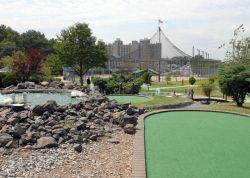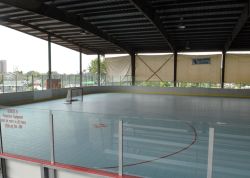Sports Park
Sports Park
In 1907 the sites that are now Sports Park, Toad Hall Playground, and Todt Hill Houses were part of a 35-acre estate owned by Moritz and Elsa Glauber. The Glaubers incorporated and sold portions of their property to their company, Glauber Land Estates, and then to the City. Parks acquired this property on January 17, 1958, in connection with the building of the Clove Lakes Expressway. In the planning stages of the expressway, several intersecting streets were closed and six parcels of land set aside for parks. This site was one of them. It remained a grassy, tree-filled park until 1991.
The surrounding neighborhood has variously been called Yserberg, Todt Hill, The Old Hill and Toad Hill. In each of these names is buried a piece of local history. From the 1600s to the end of the Revolutionary War, the Dutch name Yserberg or its English translation, Iron Mount, referred to the area’s exceptional iron resources. Evidence of iron mining on Todt Hill dates to 1644, but it is known that intensive mining took place between 1832 and 1881. In 1832 Walter Dongan granted Warmaldus Cooper permission to mine the land at the intersection of Ocean Terrace and Todt Hill. Business boomed in 1865 when iron ore was discovered in the serpentine rock that stretches from the Kill Van Kull to Fresh Kills. Because the iron lay close to the surface, it could be extracted with relative ease. By 1881 more abundant sources of iron had been found in the west.
The name Todt Hill came into use after the Revolutionary War. Todt is a variant of the Dutch word for death, and its usage likely refers to the history of the site. Some believe Todt Hill was the location of Dutch and Native American burial grounds. A document written in 1856 refers to a violent clash on the Hill between Dutch and Native Americans. Today, Moravian Cemetery lies at the foot of Todt Hill. It has also been suggested that Todt Hill is a distortion of “The Old Hill” or “Toad Hill.” The name Toad Hill appears sporadically, included on a property map dated February 4, 1857. According to local legend, a lady who lived on Todt Hill before the American Revolution was courted by two suitors, but returned the affection of only one. The other she sent from her house with toads planted in his pockets. When the spurned lover discovered these, he vowed never to return to “Toad Hill.” The story and the name are remembered in Toad Hall Playground across the street.
Iron ore and serpentine rock are but two of Todt Hill’s unique natural features. The intersection of Todt Hill Road and Ocean Terrace forms the highest point on the Atlantic coast of the United States south of Maine; it reaches 410 feet above sea level. In the 1930s, before the expressway was built, Todt Hill hosted ski jump tournaments off a 35-meter ledge on Staten Island Boulevard between Todt Hill and Little Clove Roads. Experts reached up to 100 feet, performing for as many as 3,000 onlookers. A slalom course ran 1/5 of a mile down the eastern slope of the hill. Apparently, when snowfall was scarce, slippery straw was spread over the hill. Athleticism - historical and contemporary - is celebrated in Sports Park, so named by Commissioner Henry J. Stern in 1996.
On February 26, 1991, Parks signed a license agreement with Eagle Recreation Management for the construction and operation of a miniature golf course, batting cage, snack bar, and pro shop at 215 Schmidts Lane, for a 10-year term. Playworld USA, Inc. temporarily operated the facility from May 4, 1998, to December 31, 1998. The concessionaire, as of this writing, is Staten Island Hockey. Under the terms of their contract, signed April 26, 1999, Staten Island Hockey refurbished the miniature golf course, installed new battings cage equipment, improved the snack bar, and built a regulation size, covered roller-hockey rink to meet the growing demand by local hockey leagues.
Sports Park, located in Lower Todt Hill, is bounded by the Staten Island Expressway, Manor Road, Todt Hill Road, and Schmidts Lane. August Schmidt, for whom Schmidts Lane is named, owned a large estate and one of three breweries that resided on the site now occupied by Waldbaums. Schmidt’s establishment, Manor Brewery, was closed during Prohibition in the 1920s.
Check out your park's Vital Signs
Clean & Safe
Green & Resilient
Empowered & Engaged Users
Share your feedback or learn more about how this park is part of a
Vital Park System






